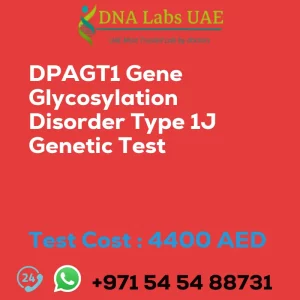PYGL Gene Glycogen storage disease type 6B Genetic Test
Introduction
The PYGL gene is responsible for producing an enzyme called liver glycogen phosphorylase. Mutations in this gene can cause a glycogen storage disease known as type 6B (GSD6B), also called phosphorylase kinase deficiency. GSD6B is an inherited disorder that affects the way the body stores and uses glycogen, which is a form of stored glucose. This condition leads to a buildup of glycogen in the liver and muscles, causing symptoms such as low blood sugar (hypoglycemia), muscle weakness, fatigue, and enlarged liver.
About the Test
The PYGL Gene Glycogen storage disease type 6B Genetic Test offered by DNA Labs UAE is a type of genetic test that uses Next-Generation Sequencing (NGS) technology. This test can analyze multiple genes simultaneously, including the PYGL gene, to identify any mutations or variations that may be associated with GSD6B. The test is conducted in the Genetics department of DNA Labs UAE.
Test Components and Price
The test costs 4400.0 AED. The sample condition required for the test can be either blood, extracted DNA, or one drop of blood on an FTA card.
Report Delivery
The test results are typically delivered within 3 to 4 weeks.
Test Type and Doctor
The PYGL Gene Glycogen storage disease type 6B Genetic Test falls under the category of Metabolic Disorders. The test is recommended by General Physicians.
Pre Test Information
Before undergoing the PYGL Gene Glycogen storage disease type 6B NGS Genetic DNA Test, it is important to provide the clinical history of the patient. Additionally, a Genetic Counselling session is conducted to draw a pedigree chart of family members affected by Glycogen storage disease type 6B.
Benefits of the Test
Genetic testing for GSD6B can be beneficial for individuals who have symptoms suggestive of the condition, as well as for family members of affected individuals who may be at risk of inheriting the condition. It can also help with family planning decisions and provide information for managing and treating the condition.
Consultation
It is important to consult with a healthcare professional or a genetic counselor to discuss the appropriateness and implications of genetic testing for GSD6B.
| Test Name | PYGL Gene Glycogen storage disease type 6B Genetic Test |
|---|---|
| Components | |
| Price | 4400.0 AED |
| Sample Condition | Blood or Extracted DNA or One drop Blood on FTA Card |
| Report Delivery | 3 to 4 Weeks |
| Method | NGS Technology |
| Test type | Metabolic Disorders |
| Doctor | General Physician |
| Test Department: | Genetics |
| Pre Test Information | Clinical History of Patient who is going for PYGL Gene Glycogen storage disease type 6B NGS Genetic DNA Test A Genetic Counselling session to draw a pedigree chart of family members affected with Glycogen storage disease type 6B |
| Test Details |
The PYGL gene is responsible for producing an enzyme called liver glycogen phosphorylase. Mutations in this gene can cause a glycogen storage disease known as type 6B (GSD6B), also called phosphorylase kinase deficiency. GSD6B is an inherited disorder that affects the way the body stores and uses glycogen, which is a form of stored glucose. This condition leads to a buildup of glycogen in the liver and muscles, causing symptoms such as low blood sugar (hypoglycemia), muscle weakness, fatigue, and enlarged liver. NGS (Next-Generation Sequencing) genetic testing is a type of genetic test that can analyze multiple genes simultaneously, including the PYGL gene, to identify any mutations or variations that may be associated with GSD6B. This test can help diagnose the condition and provide information about the specific genetic changes present in an individual. Genetic testing for GSD6B can be beneficial for individuals who have symptoms suggestive of the condition, as well as for family members of affected individuals who may be at risk of inheriting the condition. It can also help with family planning decisions and provide information for managing and treating the condition. It is important to consult with a healthcare professional or a genetic counselor to discuss the appropriateness and implications of genetic testing for GSD6B. |








